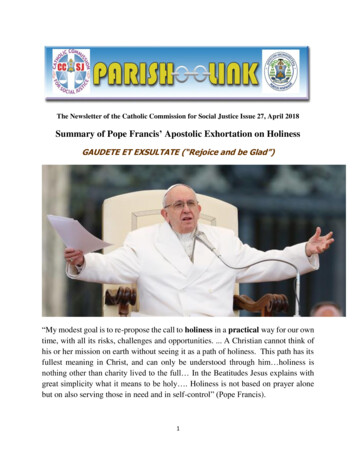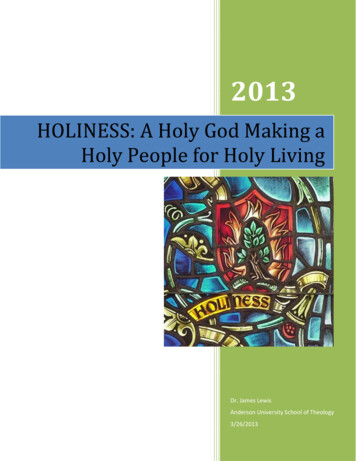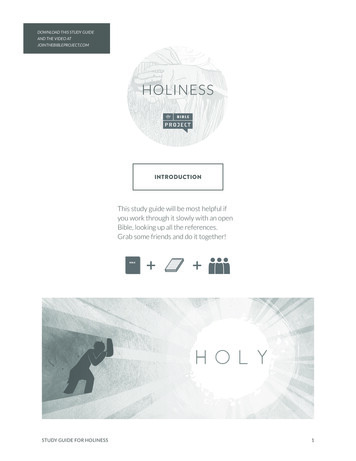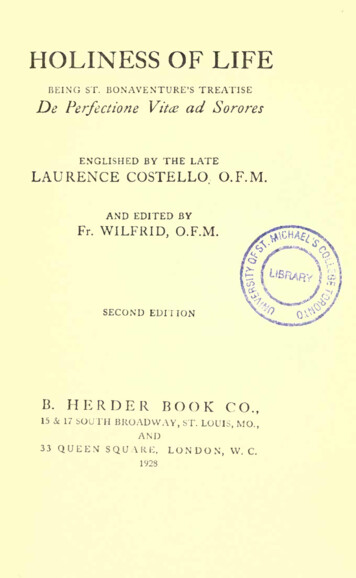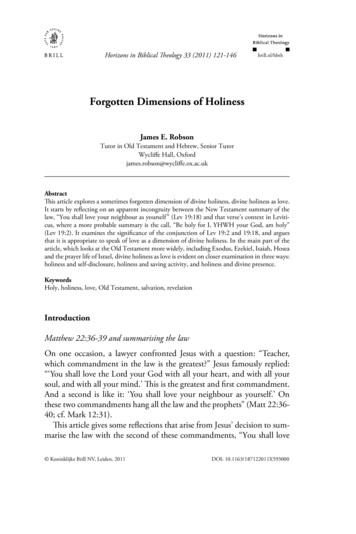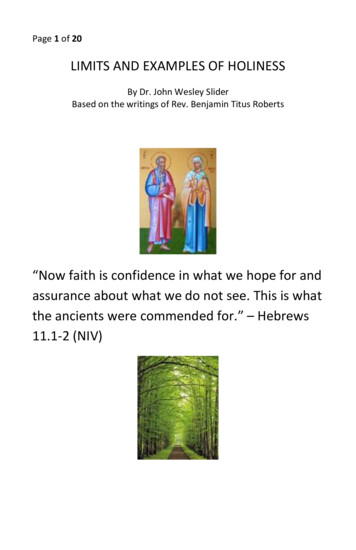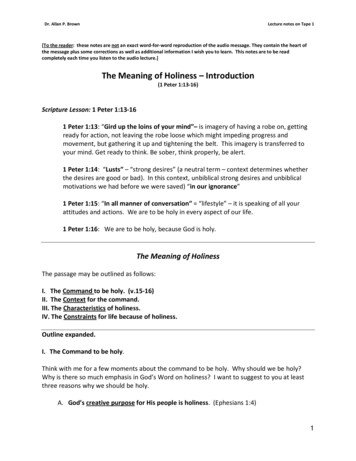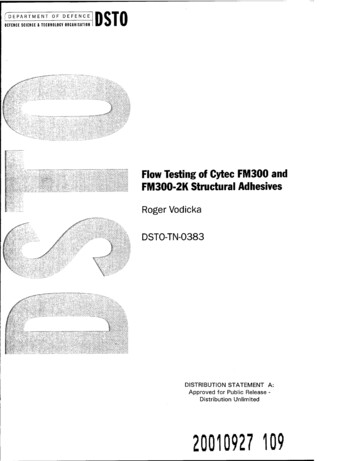
Transcription
Holinessby J. C. RyleTable of ContentsIntroductionSinSanctificationHolinessThe FightThe CostGrowthAssuranceMoses—An ExampleLot—A BeaconA Woman to Be RememberedChrist's Greatest TrophyThe Ruler of the WavesThe Church Which Christ BuildsVisible Churches WarnedDo you love Me?
Without ChristThirst RelievedUnsearchable RichesNeeds of the TimesChrist is AllCopyrightINTRODUCTIONThe twenty papers contained in this volume are a humble contribution toa cause which is exciting much interest in the present day—I mean thecause of scriptural holiness. It is a cause which everyone who loves Christ,and desires to advance His kingdom in the world, should endeavor tohelp forward. Everyone can do something and I wish to add my mite.The reader will find little that is directly controversial in these papers. Ihave carefully abstained from naming modern teachers and modernbooks. I have been content to give the result of my own study of the Bible,my own private meditations, my own prayers for light, and my ownreading of old divines. If in anything I am still in error, I hope I shall beshown it before I leave the world. We all see in part, and have a treasurein earthen vessels. I trust I am willing to learn.I have had a deep conviction for many years that practical holiness andentire self-consecration to God are not sufficiently attended to by modernChristians in this country. Politics, or controversy, or party-spirit, orworldliness, have eaten out the heart of lively piety in too many of us. Thesubject of personal godliness has fallen sadly into the background. Thestandard of living has become painfully low in many quarters. The
immense importance of "adorning the doctrine of God our Savior" ( Titus2:10), and making it lovely and beautiful by our daily habits and tempers,has been far too much overlooked. Worldly people sometimes complainwith reason that "religious" persons, so-called, are not so amiable andunselfish and good-natured as others who make no profession of religion.Yet sanctification, in its place and proportion, is quite as important asjustification. Sound Protestant and Evangelical doctrine is useless if it isnot accompanied by a holy life. It is worse then useless; it does positiveharm. It is despised by keen-sighted and shrewd men of the world, as anunreal and hollow thing, and brings religion into contempt. It is my firmimpression that we want a thorough revival about Scriptural holiness.and I am deeply thankful that attention is being directed to the point.It is, however, of great importance that the whole subject should beplaced on right foundations, and that the movement about it should notbe damaged by crude, disproportion, and one-sided statements. If suchstatements abound, we must not be surprised. Satan knows well thepower of true holiness, and the immense injury which increased attentionto it will do to his kingdom. It is his interest, therefore, to promote strifeand controversy about this part of God's truth. Just as in time past he hassucceeded in mystifying and confusing men's minds about justification,so he is laboring in the present day to make men "darken counsel bywords without knowledge" about sanctification. May the Lord rebukehim! I can not however give up the hope that good will be brought out ofevil, that discussion will elicit truth, and that variety of opinion will leadus all to search the Scriptures more, to pray more, and to become morediligent in trying to find out what is "the mind of the Spirit."I now feel it a duty, in sending forth this volume, to offer a fewintroductory hints to those whose attention is specially directed to thesubject of sanctification in the present day. I know that I do so at the riskof seeming presumptuous, and possibly of giving offence. But somethingmust be ventured in the interests of God's truth. I shall therefore put myhints into the form of questions, and I shall request my readers to takethem as "Cautions for the Times on the subject of holiness."(1) I ask, in the first place, whether it is wise to speak of faith as the onething needful, and the only thing required, as many seem to do now-a-
days in handling the doctrine of sanctification? -Is it wise to proclaim inso bald, naked, and unqualified a way as many do, that holiness ofconverted people is by faith only, and not at all by personal exertion? Is itaccording to the proportion of God's Word? I doubt it.That faith in Christ is the root of all holiness--that the first step towards aholy life is to believe on Christ--that until we believe we have not a jot ofholiness--that union with Christ by faith is the secret of both beginning tobe holy and continuing holy--that the life that we live in the flesh we mustlive by the faith of the Son of God--that faith purifies the heart-- that faithis the victory that overcomes the world--that by faith the elders obtaineda good report--all these are truths which no well-instructed Christian willever think of denying. But surely the Scriptures teach us that in followingholiness the true Christian needs personal exertion and work as well asfaith. The very same Apostle who says in one place, "The life that I live inthe flesh I live by the faith of the Son of God," says in another place, "Ifight--I run--I keep under my body;" and in other places, "Let us cleanseourselves--let us labor, let us lay aside every weight." ( Galatians 2:20; 1Corinthians 9:26; 2 Corinthians 7:1; Hebrews 4:11; Hebrews 12:1.)Moreover, the Scriptures nowhere teach us that faith sanctifies us in thesame sense, and in the same manner, that faith justifies us! Justifyingfaith is a grace that "works not," but simply trusts, rests, and leans onChrist. ( Romans 4:5.) Sanctifying faith is a grace of which the very life isaction: it "works by love," and, like a main-spring, moves the wholeinward man. ( Galatians 5:6.) After all, the precise phrase "sanctified byfaith" is only found once in the New Testament. The Lord Jesus said toSaul, "I send you, that they may receive forgiveness of sins andinheritance among those who are sanctified by faith that is in Me." Yeteven there I agree with Alford that "by faith" belongs to the wholesentence, and must not be tied to the word "sanctified." The true sense is,"that by faith in Me they may receive forgiveness of sins and inheritanceamong those who are sanctified." (Compare Acts 26:18 with Acts 20:32.)As to the phrase "holiness of faith," I find it nowhere in the NewTestament. Without controversy, in the matter of our justification beforeGod, faith in Christ is the one thing needful. All that simply believe arejustified. Righteousness is imputed "to him that works not but believes." (
Romans 4:5.) It is thoroughly Scriptural and right to say "faith alonejustifies." But it is not equally Scriptural and right to say "faith alonesanctifies." The saying requires very large qualification. Let one factsuffice. We are frequently told that a man is "justified by faith without theworks of the law," by St. Paul. But not once are we told that we are"sanctified by faith without the deeds of the law." On the contrary, we areexpressly told by St. James that the faith whereby we are visibly anddemonstratively justified before man, is a faith which "if it has not worksis dead, being alone." * ( James 2:17.) I may be told, in reply, that no oneof course means to disparage "works" as an essential part of a holy life. Itwould be well, however, to make this more plain then many seem to makeit in these days.* "There is a double justification by God: the one authoritative, the otherdeclarative or demonstrative."--The first is St. Paul's scope, when hespeaks of justification by faith without the deeds of the law. The second isSt. James' scope, when he speaks of justification by works." --T. Goodwinon Gospel Holiness. Works, vol. vii, p. 181.(2) I ask, in the second place, whether it is wise to make so little as someappear to do, comparatively, of the many practical exhortations toholiness in daily life which are to be found in the Sermon on the Mount,and in the latter part of most of St. Paul's epistles? Is it according to theproportion of God's Word? I doubt it.That a life of daily self-consecration and daily communion with Godshould be aimed at by everyone who professes to be a believer --that weshould strive to attain the habit of going to the Lord Jesus Christ witheverything we find a burden, whether great or small, and casting it uponHim--all this, I repeat, no well-taught child of God will dream ofdisputing. But surely the New Testament teaches us that we wantsomething more then generalities about holy living, which often pierce noconscience and give no offence. The details and particular ingredients ofwhich holiness is composed in daily life, ought to be fully set forth andpressed on believers by all who profess to handle the subject. Trueholiness does not consist merely of believing and feeling, but of doing andbearing, and a practical exhibition of active and passive grace. Ourtongues, our tempers, our natural passions and inclinations-- our
conduct as parents and children, masters and servants, husbands andwives, rulers and subjects--our dress, our employment of time, ourbehavior in business, our demeanor in sickness and health, in riches andpoverty--all, all these are matters which are fully treated by inspiredwriters. They are not content with a general statement of what we shouldbelieve and feel, and how we are to have the roots of holiness planted inour hearts. They dig down lower. They go into particulars. They specifyminutely what a holy man ought to do an be in his own family, and by hisown fireside, if he abides in Christ. I doubt whether this sort of teachingis sufficiently attended to in the movement of the present day. Whenpeople talk of having received "such a blessing," and of having found "thehigher life," after hearing some earnest advocate of "holiness by faith andself-consecration," while their family and friends see no improvementand no increased sanctity in their daily tempers and behavior, immenseharm is done to the cause of Christ. True holiness, we surely ought toremember, does not consist merely of inward sensations andimpressions. It is much more then tears, and sighs, and bodilyexcitement, and a quickened pulse, and a passionate feeling ofattachment to our favorite preachers and our own religious party, and areadiness to quarrel with everyone who does not agree with us. It issomething of "the image of Christ." which can be seen and observed byothers in our private life, and habits, and character, and doings. ( Romans8:29.)(3) I ask in the third place, whether it is wise to use vague language aboutperfection, and to press on Christians a standard of holiness, as attainablein this world for which there is no warrant to be shown either in Scriptureor experience? I doubt it.That believers are exhorted to "perfect holiness in the fear of God"--to "goon to perfection"--to "be perfect," no careful reader of his Bible will everthink of denying. ( 2 Corinthians 7:1; Hebrews 6:1; 2 Corinthians 13:11.)But I have yet to learn that there is a single passage in Scripture whichteaches that a literal perfection, a complete and entire freedom from sin,in thought, or word, or deed, is attainable, or has ever been attained, byany child of Adam in this world. A comparative perfection, a perfection inknowledge, an all-around consistency in every relation of life, a through
soundness in every point of doctrine--this may be seen occasionally insome of God's believing people. But as to an absolute literal perfection,the most eminent saints of God in every age have always been the verylast to lay claim to it! On the contrary they have always had the deepestsense of their own utter unworthiness and imperfection. The morespiritual light they have enjoyed the more they have seen their owncountless defects and shortcomings. The more grace they have had themore they been "clothed with humility." ( 1 Peter 5:5.)What saint can be named in God's Word, of whose life many details arerecorded, who was literally and absolutely perfect? Which of them all,when writing about himself, ever talks of feeling free from imperfection?On the contrary, men like David, and St. Paul, and St. John, declare in thestrongest language that they feel in their own hearts weakness and sin.The holiest men of modern times have always been remarkable for deephumility. Have we ever seen holier men then the martyred JohnBradford, or Hooker, or Usher, or Baxter, or Rutherford, or M'Cheyne?Yet no one can read the writings and letters of these men without seeingthat they felt themselves "debtors to mercy and grace" every day, and thevery last thing they ever laid claim to was perfection!In face of such facts as these I must protest against the language used inmany quarters, in these last days, about perfection. I must think thatthose who use it either know very little of the nature of sin, or theattributes of God, or of their own hearts, or of the Bible, or of themeaning of words. When a professing Christian coolly tells me that hehas got beyond such hymns as "Just as I am," and that they are below hispresent experience, though they suited him when he first took upreligion, I must think his soul is in a very unhealthy state! When a mancan talk coolly of the possibility of "living without sin" while in the body,and can actually say that he has "never had an evil thought for threemonths," I can only say that in my opinion he is a very ignorantChristian! I protest against such teaching as this. It not only does nogood, but does immense harm. It disgusts and alienates from religion farseeing men of the world, who know it is incorrect and untrue. Itdepresses some of the best of God's children, who feel they never canattain to "perfection" of this kind. It puffs up many weak brethren, who
fancy they are something when they are nothing. In short, it is adangerous delusion.(4) In the fourth place, is it wise
holiness the true Christian needs personal exertion and work as well as faith. The very same Apostle who says in one place, "The life that I live in the flesh I live by the faith of the Son of God," says in another place, "I fight--I run--I keep under my body;" and in other places, "Let us cleanse ourselves--let us labor, let us lay aside every weight." ( Galatians 2:20; 1
